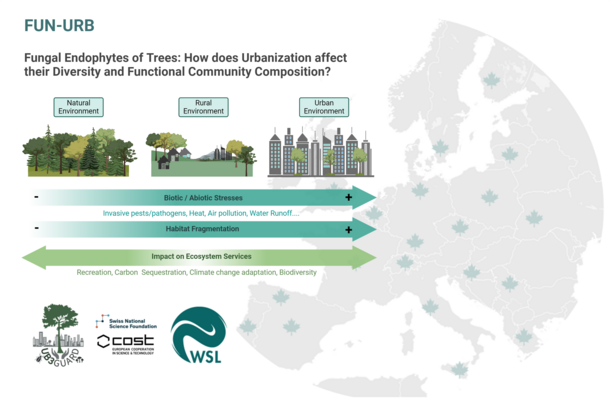Fungal endophytes of trees: how does urbanization affect their diversity and functional community composition?
2024 - 2027
FinancingProject FUN-URB ¶
Plants are no longer seen as individual entities but rather as holobionts, encompassing the plant host and its closely associated microbial communities. These microorganisms can be altered due to various abiotic and biotic stresses which in turn has an impact on plant host fitness and physiological functioning. Fungal endophytes, which colonize healthy plant tissues and persist throughout the plant's life cycle, can shift from beneficial to detrimental based on the plant's life stage and health status.
In this context, urban environments introduce several stressors, such as increased temperatures, air pollution, and habitat fragmentation, impacting plant-microbiome interactions. Despite this awareness, limited studies have explored fungal tree endophytes in urban settings, often focusing on specific tree species and small geographic scales.
This research project will address these gaps by:
- Examining diversity patterns of foliar fungal endophytes in trees along urbanization gradients in several cities along a latitudinal/longitudinal gradient in Europe
- Considering multiple native and non-native tree species which are commonly found in urban settings
- Using long read high-throughput sequencing techniques to capture comprehensive fungal communities and diversities.
Sampling efforts will be carried out through collaborations with participants from the COST-action CA20132 "Urban Tree Guard - Safeguarding European urban trees and forests through improved biosecurity".
The outcomes of this project will significantly enhance our understanding of the interplay between anthropogenic activities and the diversity patterns of tree-associated microorganisms on a wide geographical scale.

